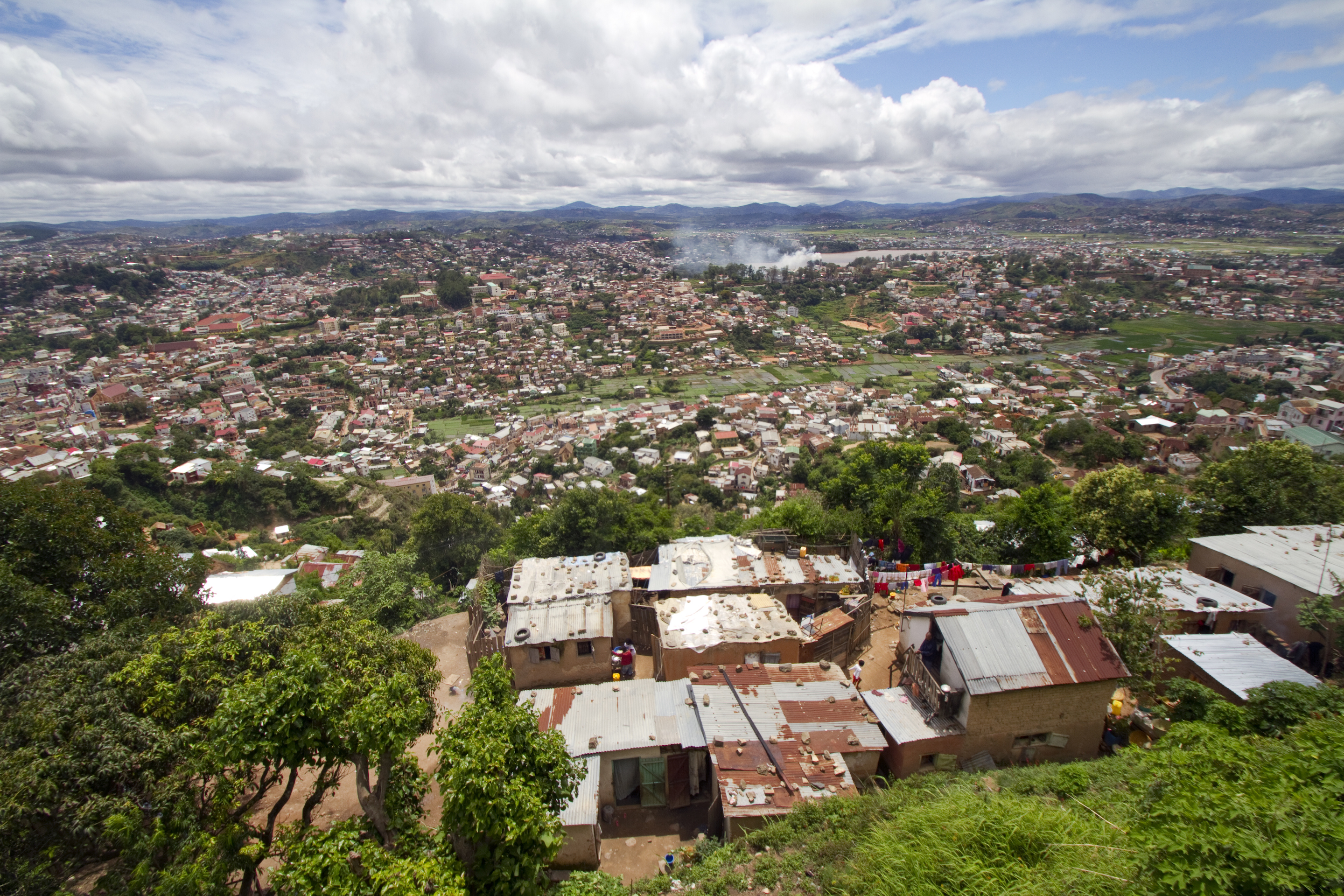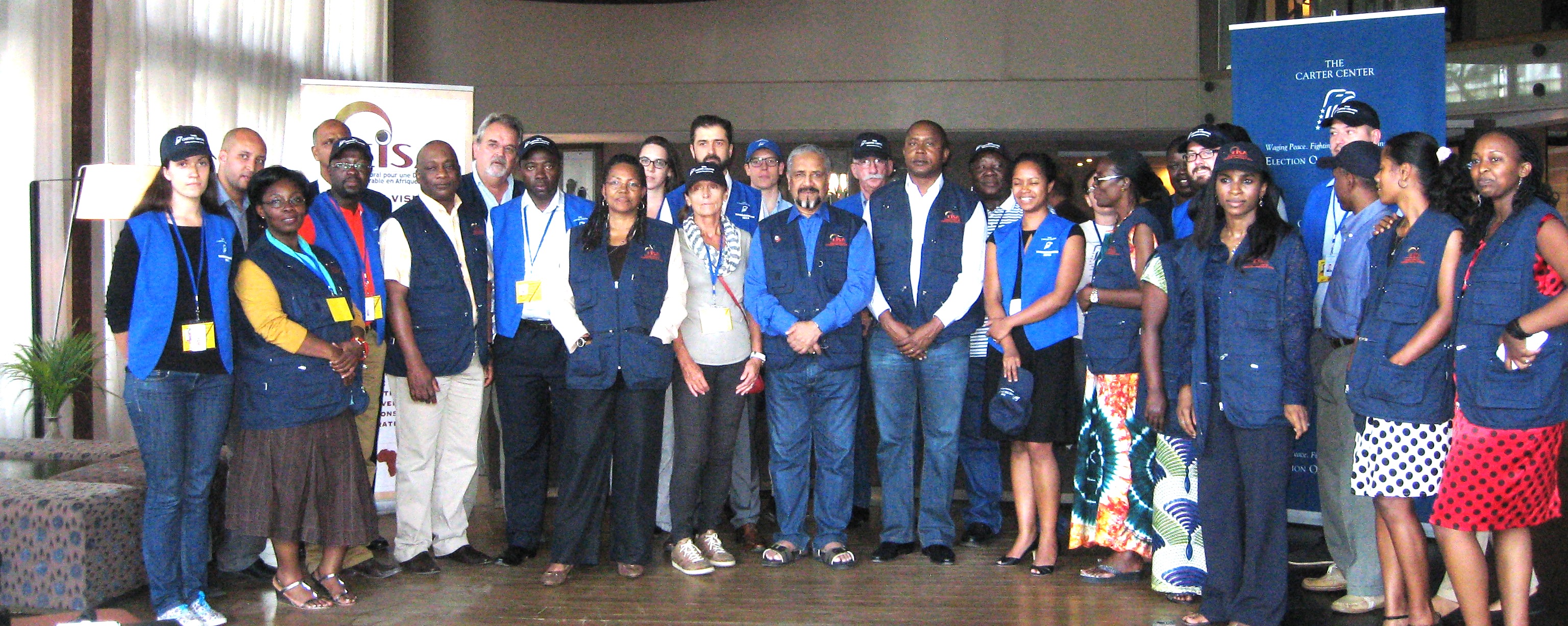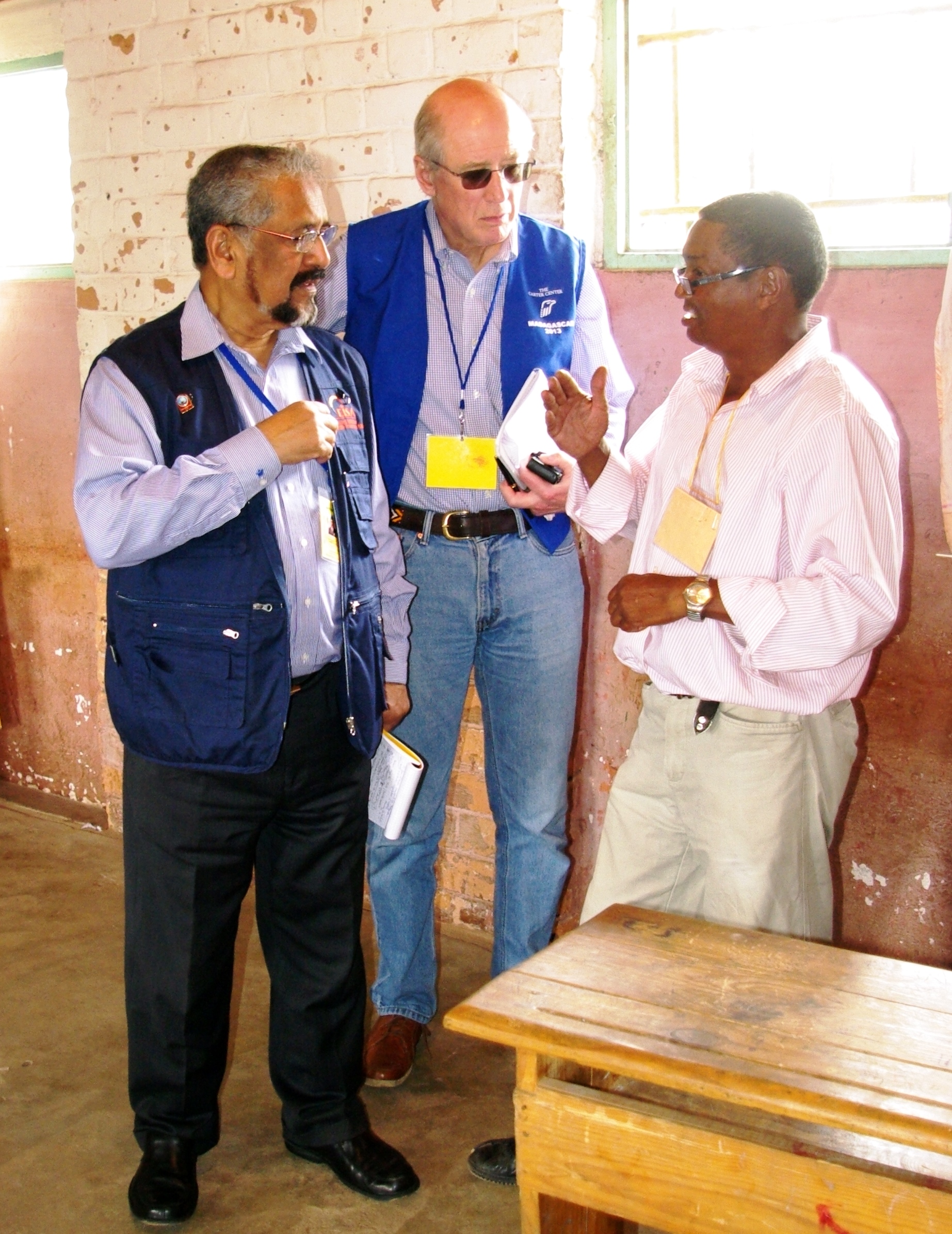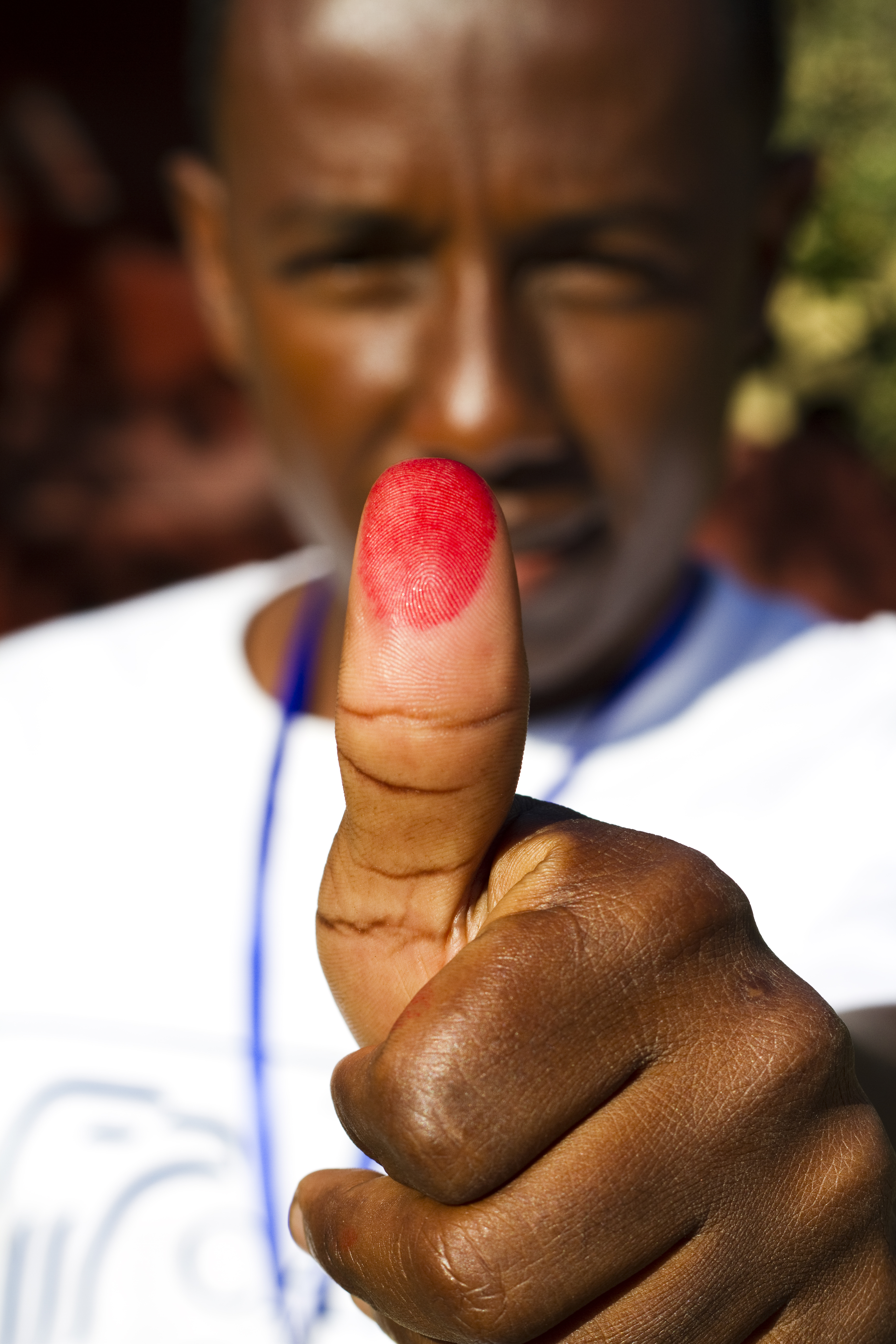
(Photo by Thomas Cox)
Madagascar held the first round of presidential elections on Oct. 25, 2013, and the second round runoff presidential and legislative elections on Dec. 20, 2013. The Carter Center’s observations and findings summarized in this report relate only on the second round of presidential elections and legislative elections.
The following is an excerpt from the final report. The full report can be found here.
These elections marked a pivotal point for Madagascar, as its leadership sought a return to genuine democratic government, and normalized relations with the international community. Madagascar has been in international political isolation since a 2009 coup d’état prompted its foreign partners to sever ties and eliminate critical financial support. The coup and the subsequent isolation it provoked created a devastating political crisis that lasted for nearly five years.
The road to elections was rocky, but they took place after years of negotiations and international pressure. As a result, Madagascar now has an opportunity to rejoin the community of nations and the foundation to forge a solution to the prolonged humanitarian crisis.
The Carter Center met with critical stakeholders, including the leadership of CENI-T, during a pre-election assessment in February 2013. During the course of that visit, CENI-T formally invited the Carter Center to observe the elections. Upon accepting CENI-T’s invitation, in mid-October the Center deployed a core team to set up a field office in the capital, Antananarivo. The following month, six international long-term observers (LTOs) arrived in Madagascar and were deployed across the country. During the month leading up to the elections, the LTOs observed electoral preparations, met with various stakeholders, and monitored important political developments in their respective areas of responsibility. As the election date neared, Carter Center staff from the Atlanta office deployed to Antananarivo to assist the mission. With our partner, the Electoral Institute for Sustainable Democracy in Africa (EISA), the Carter Center deployed 26 observers to a total of 85 polling stations in six different regions of Madagascar.
Observers from the integrated EISA/Carter Center mission reported that voting and counting processes were peaceful, orderly, and in general accordance with Madagascar’s legal framework and obligations for democratic elections. In polling stations that Carter Center and EISA members observed, voter turnout was moderate at only about 50 percent.

The Center commends the CENI-T for their efforts to ensure that all eligible voters had an opportunity to cast their ballots freely. Although Carter Center and EISA observers noted several shortcomings in the process, including inconsistent use of separate voter lists for the presidential and legislative elections, delays in delivery of materials to some polling stations, and inconsistent inking procedures, these shortcomings were not systematic and did not appear to have significantly influenced the outcome of the elections. Carter Center observers also reported that the polling process was good or excellent in 82 percent of stations observed.
KEY FINDINGS AND RECOMMENDATIONS
Legal Framework
To the Government of Madagascar: Introduce campaign finance regulations, modify framework for dispute resolution, improve women’s representation
The legal framework for the 2013 Malagasy presidential and legislative elections was established by the Constitution of Dec. 11, 2010, the roadmap of Sept. 16, 2011, and the laws and regulations of the Republic of Madagascar. In this report the Carter Center recommends areas where aspects of the legal framework could be strengthened, including the introduction of campaign finance reforms, modifications of the framework for electoral dispute resolution, and adjustments to enhance women’s participation in politics.

Election Administration
To the Government of Madagascar: Continue to support the independence of the Commission and develop its capacity
For the first time in Madagascar’s history, elections were organized and managed by an independent electoral authority, the Commission Electorale Nationale Indépendante pour la Transition (CENI-T). International obligations for democratic elections indicate that an independent, professional, transparent, and impartial election authority is fundamental to ensuring that citizens are able to participate in genuine democratic elections. The formation of CENI-T marked an important step forward, and its independence should continue to be strengthened.
Voter Registration
To the Government of Madagascar: Commit to revise the voter registration process to ensure accurate and complete voter registry in advance of future elections
Although the Center did not directly observe the registration process, and while accurate demographic data is unavailable, analysis suggests that the register likely underrepresented the voting age population. On election day, observers noted confusion surrounding the introduction of the additive voter lists (a list of additions made to the voters list between the first and second round of elections). Observers also noted challenges related to the inadequate distribution of voter cards. The Carter Center recommends revision of Madagascar’s voter registration process to ensure an accurate and complete voter registry in advance of future elections.
Voter Education
To the Government of Madagascar: Commit to development of extensive and nation-wide voter education program in advance of future elections
Voter education is an essential part of any legitimate electoral cycle and an informed electorate ensures that the electoral results are a genuine expression of the will of the people. The 2013 elections included a number of important changes that would have benefited from corresponding voter education messages, including the introduction of a single ballot paper for the first time and a change in voter identification procedures. However, Carter Center observers reported limited voter education activities across the country. In future elections there should be a commitment to development of an extensive and nation-wide voter education program.
Candidates, Parties, and Campaigns
To Political Parties and the Government of Madagascar: Strengthen political parties, improve access to candidacies by women
In a healthy democracy, political parties play a critical role in linking citizens to government. Madagascar has accepted important international obligations regarding political candidates, parties, and campaigns including political pluralism, freedom of assembly, the right to run for office, and competitive elections. Candidate interest was high, as 33 presidential candidates were on the ballot during the first round of elections, while 2,054 candidates contested legislative elections. Despite the large number of candidates, only two of the 33 presidential candidates were women. That proportion was slightly higher in legislative elections, but still low with just 15 percent being women.
Although the abundance of over 200 political parties in Madagascar is indicative of competition, most parties are weak, lack internal organization and institutions, and are inactive outside of the capital.
Political parties in Madagascar should strive to develop issue-based platforms and build membership bases across the country and beyond the capital. Steps should be taken to strengthen internal party structure, organization, and democracy. Steps should also be taken to increase women’s participation in political parties, including in leadership positions and as candidates.
Voting
To the CENI-T: Reduce opening delays and improve delivery of materials
Carter Center and EISA observers visited 85 polling stations and reported that election day proceeded in an atmosphere that was primarily calm and peaceful. There were no reported incidents of election-related violence. Voter turnout on election day was modest at about 50 percent, a drop of nearly 10 percent from the turnout level reported in the first round. Most observers reported delays in the opening of polling stations, but these delays did not affect the polling process. Observers also reported that the voting process was relatively efficient and standard operating procedures were usually followed. Isolated irregularities occurred in various polling stations including the late arrival of ballots and confusion over voter identification, but they did not undermine the fundamental integrity of the electoral process nor prevent registered voters from participating in that process. In future elections, CENI-T should strive to reduce opening delays and improve delivery of materials.

Closing and Counting
To the Government of Madagascar: Review electoral law to strengthen counting procedures
Accurate and fair vote counting plays an indispensable role in ensuring the electoral process is democratic and reflects the will of the voters. Although no significant irregularities were observed during the counting process, future elections would benefit from a review of the electoral law to strengthen counting procedures to ensure an accurate count and provide stronger guidance to polling staff.
Tabulation and Results
To the Government of Madagascar: The full authority for the counting, tabulation, and announcement of results should rest with independent bodies, and any distribution of responsibility for tabulation should be done in a way that preserves the efficiency and transparency of the process
Tabulation of results is an integral phase of the electoral process that ensures the will of voters is accurately and comprehensively reflected in final results. In the days following the polls, Carter Center observers reported that the tabulation process generally met Madagascar’s international obligations. The Special Elections Court (CES) announced the results of the presidential election on January 17, 2014, officially declaring Hery Rajaonarimampianina the winner, and legislative results were announced on February 7. While some results were not included in the final count primarily due to unreadable certified copies of polling station tallies, the total number of votes left out of the final count was not significant enough to change the outcome of the election.
Although the CENI-T conducted the tabulation process and announced provisional results, Madagascar’s legal framework calls for official results to be announced separately by the CES. Further consideration should be given to the process of tabulating and announcing official results, In future elections, the authority for the counting, tabulation, and announcement of results should rest with an independent electoral authority. If this responsibility continues to be divided across two institutions, the division of responsibility should be done in a way that preserves the efficiency and transparency of the tabulation process.
Electoral Dispute Resolution
To the Government of Madagascar: Continue to support the independence of the CES, revise legal framework to allow more time to file complaints and to broaden overly restrictive criteria for filing complaints
A total of 650 complaints were submitted to the Special Elections Court (CES) after the elections regarding the presidential and legislative electoral proceedings. The CES responded swiftly and in an impartial manner in the electoral dispute process.
While this was a positive part of the electoral process, consideration should be given to revision of the legal framework for dispute resolution to allow more time to file complaints. As it stands, complaints must be filed within 10 days of polling, which means that complaints must be filed before results are announced, and prohibits any formal complaints about the results themselves. Legislators should modify Art. 132 of the Electoral Law in order to allow appeals and complaints after the release of provisional results by CENI-T.
In addition, consideration should be given to broadening the criteria for filing complaints. Currently the criteria for the plaintiff to file a complaint are to : 1) be a registered voter; 2) have participated in the election; 3) to limit complaints to activities in the polling station where the voter is registered and 4) to limit the subject of complaints only to the regularity of voting operations. These restrictions weaken the Malagasy citizen’s right to an effective remedy against improper action, a right that is recognized in international standards for democratic elections.
Conclusions
In summary, the Center found the electoral process to be generally orderly and transparent and in accordance with international obligations for democratic elections. The Carter Center urges Madagascar to use these elections as a foundation on which to foster both democratic development and national reconciliation. The Center commends the Malagasy people for participating in a peaceful and orderly process and for the successful democratic elections of 2013. There is, however, room for improvement. To continue its progress toward democratic governance, the government of Madagascar should make efforts to make campaign finance significantly more transparent, ensure greater representation of women in future elections, empower civil society organizations to educate the Malagasy people on voting procedures, and focus on national reconciliation and cooperation.
